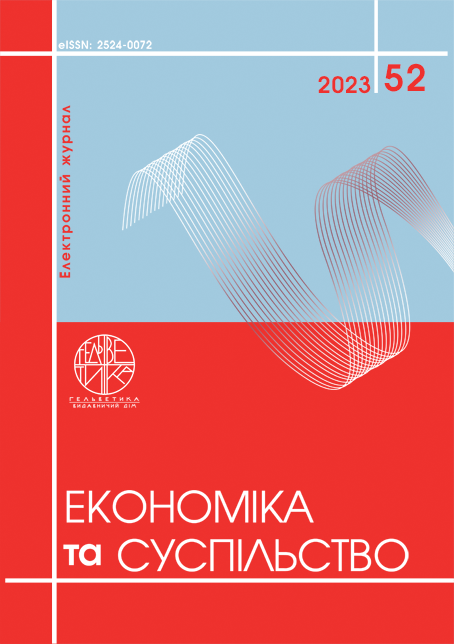INFLUENCE OF LOGISTICS PROCESSES OPTIMIZATION ON THE EFFICIENCY OF THE ENTERPRISE COMMERCIAL ACTIVITY
Abstract
The article is devoted to the study of the influence of the logistics processes optimization on the efficiency of the enterprise commercial activity. The topic is highly relevant in the context of modern business operations where organizations strive to streamline their supply chains and enhance overall performance. The study outlines the significance of logistics optimization and its implications for commercial success. It highlights the challenges faced by businesses in managing their supply chains and emphasizes the need for effective solutions. The results of the study demonstrate that implementing logistics optimization strategies leads to substantial improvements in operational efficiency and financial performance. By adopting advanced technologies companies can optimize inventory management, reduce transportation costs and enhance customer satisfaction. The findings also highlight the importance of collaboration with suppliers and the integration of sustainable practices into logistics operations which not only contribute to cost savings but also enhance corporate social responsibility. The practical implications of this research are significant for businesses seeking to enhance their competitiveness and profitability. The study provides practical recommendations for organizations to optimize their logistics processes, including the adoption of modern information systems, the implementation of lean principles and the establishment of strategic partnerships with key suppliers. By implementing these recommendations companies can achieve cost savings, improve service quality and gain a competitive edge in the market. The article sheds light on the crucial role of logistics optimization in improving the efficiency of commercial activities. The findings underscore the importance of embracing technological advancements, fostering collaboration and integrating sustainable practices in logistics operations. Ultimately, the study contributes to the body of knowledge in the field of logistics management and offers actionable insights for practitioners seeking to optimize their supply chain processes.
References
Christopher, M. (2016). Logistics and Supply Chain Management (5th ed.). Pearson, London.
Council of Supply Chain Management Professionals. (2014). CSCMP’s Supply Chain Management Definitions and Glossary. URL: http://cscmp.org/
Datta, P. P., & Christopher, M. (2011). Logistics Research: A Critical Analysis. International Journal of Physical Distribution & Logistics Management, 41(3).
Fawcett, S.E., Ellram, L.M., & Ogden, J.A. Supply Chain Management: From Vision to Implementation (2nd ed.). Pearson, London. 2014.
Lambert, D.M., & Cooper, M.C. (2000). Issues in Supply Chain Management. Industrial Marketing Management, 2000. Vol. 29(1).
Mentzer J.T., DeWitt W., Keebler J.S., Min S., Nix N.W., Smith C.D., & Zacharia, Z.G. Defining Supply Chain Management. Journal of Business Logistics, 2001. Vol. 22(2).
Pienaar W.J. Supply Chain Management in a South African Context (2nd ed.). Juta and Company Ltd. 2013.
Rogers D.S., & Tibben-Lembke R.S. Going Backwards: Reverse Logistics Trends and Practices. Reverse Logistics Executive Council. 1998. URL: https://www.icesi.edu.co/blogs/gestionresiduossolidos/files/2008/11/libro-lr.pdf
Simchi-Levi D., Kaminsky P., & Simchi-Levi E. Designing and Managing the Supply Chain: Concepts, Strategies and Case Studies (3rd ed.). McGraw-Hill. 2008.
Stock J.R., & Lambert D.M. (2001). Strategic Logistics Management (4th ed.). McGraw-Hill. 2001.
Christopher M. (2016). Logistics and Supply Chain Management (5th ed.). Pearson, London.
Council of Supply Chain Management Professionals. (2014). CSCMP’s Supply Chain Management Definitions and Glossary. Available at: http://cscmp.org/
Datta P.P., & Christopher M. (2011). Logistics Research: A Critical Analysis. International Journal of Physical Distribution & Logistics Management, 41(3).
Fawcett S.E., Ellram L.M., & Ogden J.A. (2014). Supply Chain Management: From Vision to Implementation (2nd ed.). Pearson, London.
Lambert, D.M., & Cooper, M.C. (2000). Issues in Supply Chain Management. Industrial Marketing Management, 29(1).
Mentzer J.T., DeWitt W., Keebler J.S., Min S., Nix N.W., Smith C.D., & Zacharia, Z.G. (2001). Defining Supply Chain Management. Journal of Business Logistics, 22(2).
Pienaar W.J. (2013). Supply Chain Management in a South African Context (2nd ed.). Juta and Company Ltd.
Rogers D.S., & Tibben-Lembke R.S. (1998). Going Backwards: Reverse Logistics Trends and Practices. Reverse Logistics Executive Council. Available at: https://www.icesi.edu.co/blogs/gestionresiduossolidos/files/2008/11/libro-lr.pdf
Simchi-Levi D., Kaminsky P., & Simchi-Levi E. (2008). Designing and Managing the Supply Chain: Concepts, Strategies and Case Studies (3rd ed.). McGraw-Hill.
Stock J.R., & Lambert D.M. (2001). Strategic Logistics Management (4th ed.). McGraw-Hill.
Copyright (c) 2023 Едуард Савицький

This work is licensed under a Creative Commons Attribution 4.0 International License.


